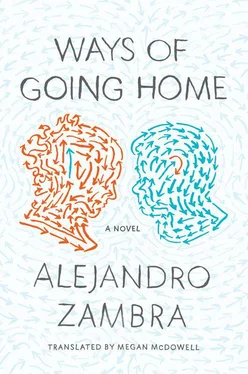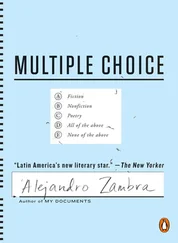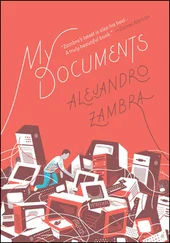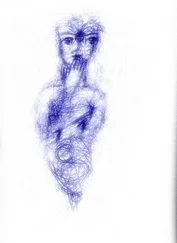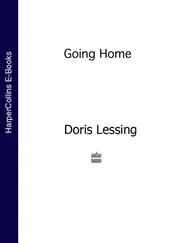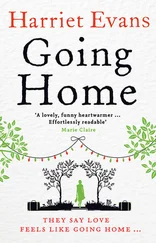At what moment, I think, did my father change so much? Upon thinking this I immediately question it: I don’t know if he has actually changed or if he was always like this. “I’ve stolen, I’ve stolen a lot,” I say, to annoy him. At first my father laughs.
“Sure, you took money from my wallet, but that’s not stealing.”
“That is stealing,” I answer seriously, sententiously. “Stealing from your father is still stealing. And I’ve also stolen books. One week I stole eighteen books.” I say eighteen so it will sound excessive but still true, but really it was three and I felt so guilty I never went back to that bookstore. But I stand behind what I said, I don’t take it back, and my father looks at me severely. He looks at me the way a father would look at a thieving son — a son already lost to him, in jail, on visitors’ day.
My mother tries to ease the tension. “Who hasn’t stolen at some time in their life?” she says, and slips into some anecdote from her childhood, looking at Claudia. She asks if she has ever stolen anything. Claudia answers that she hasn’t, but if she was desperate maybe she would.
Claudia says that her head hurts. I ask her to go lie down. We go to the room that was mine as a child. I make up the sofa bed and hug Claudia; she lies back and closes her eyes, her eyelids trembling slightly. I kiss her, I promise her that as soon as she feels better we will leave. “I don’t want to leave,” she says unexpectedly. “I want to stay here, I think we need to sleep here tonight, don’t ask me why,” she says. I discover then that she isn’t sick. I feel confused.
I go over to the little shelf holding the old family photo albums. That’s what these albums are for, I think: to make us believe we were happy as children. To show ourselves that we don’t want to accept how happy we were. I turn the pages slowly. I show Claudia a very old picture of my father getting off a plane, with long hair and very thick lenses blurring his eyes.
“Go back to the table,” Claudia says, or requests. “I want to be alone for a few hours.” She doesn’t say for a while or for a bit. She says she wants to be alone for a few hours.
My mother reheats the food in the microwave while my father tunes the radio in search of a classical music station — he’s never liked it but he thinks it’s the appropriate music for dinner. He stands there, turning the dial; he is upset and he doesn’t want to look at me. “Sit down, Dad, we’re talking,” I say with sudden authority.
While we eat I ask my parents if they remember the night of the 1985 earthquake, if they remember our neighbor Raúl. My mother gets the neighbors and their families confused, while my father remembers Raúl perfectly. “I understand he was a Christian Democrat,” he says, “although it was also rumored he was something more than that.”
“How so?”
“I don’t know, it seems he was a Socialist, or a Communist, even.”
“Communist like my grandfather?”
“My father wasn’t a Communist. My father was a worker, that’s all. Raúl must have been something more dangerous. But no, I don’t know. He seemed peaceful enough. Anyway, if Piñera wins the elections, the party’s over for Raúl. I’m sure he’s lived high on the hog off those corrupt and chaotic governments.”
He says it to provoke me. I let him talk. I let him say a few simplistic and bitter phrases. “They’ve had their hands in our pockets all these years,” he says. “Those Concertación people are a bunch of thieves,” he says. “A little order will do this country good.” And then comes the feared pronouncement I’d been waiting for, the line that I can’t, that I will not, allow to be crossed: “Pinochet was a dictator and all, he killed some people, but at least back then there was order.”
* * *
I look him in the eyes. At what moment, I think, at what moment did my father turn into this? Or was he always like this? Was he always like this? I think it forcefully, with a severe and painful theatricality: Was he always this way?
My mother doesn’t agree with what my father has said. Really, she more or less agrees, but she wants to do something to keep from spoiling the evening. “The world is much better now,” she says. “Things are good. And Michelle is doing the best she can.”
I can’t help asking my father if in those years he was a Pinochet supporter. I’ve asked him that question hundreds of times, since I was a teenager; it’s almost a rhetorical question, but he’s never admitted it — why not admit it? I think. Why deny it for so many years, why deny it still?
My father sits in sullen, deep silence. Finally he says that no, he wasn’t a Pinochet supporter, that he learned as a child that no one was going to save us.
“Save us from what?”
“Save us. Give us food to eat.”
“But you had food to eat. We had food to eat.”
“It’s not about that,” he says.
* * *
The conversation becomes unbearable. I get up to go check on Claudia. I stare at her intensely, but she goes on turning pages as if she doesn’t notice I’m there. By now she’s gone through half the albums. Her gaze absorbs, devours the images. Sometimes she smiles, sometimes her face becomes so serious that a sadness descends on me. No, I don’t feel sadness: I feel fear.
I go back to the table; the vanilla ice cream is melting on my plate. I tell them in a low but very fast voice, so fast that the details become unintelligible, that Claudia was Raúl’s daughter but for years she had to pretend she was his niece. That Raúl was really named Roberto. I don’t know what I am hoping for by telling them. But I’m hoping for something, looking for something.
* * *
“It’s a complicated story, but a good one,” says my father, after a not very long silence.
“Are you fucking with me? A good story? It’s a painful story.”
“It’s a painful story, but it’s over now. Claudia is alive. Her parents are alive.”
“Her parents are dead,” I say.
“Were they killed by the dictatorship?”
“No.”
“And how did they die?”
“Her mother died of a cerebral hemorrhage and her father of cancer.”
“Poor Claudia,” says my mother.
“But they didn’t die for political reasons,” says my father.
“But they’re dead.”
“But you’re alive,” he says. “And I bet you’ll use such a good story in a book.”
“I’m not going to write a story about them. I’m going to write about you two,” I say, with a strange smile on my face. I can’t believe what has just happened. I hate being the son who recriminates his parents, over and over again. But I can’t help it.
I look straight at my father and he turns his face away. Then I see in his profile the shine of a contact lens and his slightly irritated right eye. I remember the scene, repeated countless times during my childhood: my father kneeling down, desperately searching for a contact lens that has just fallen out. We would all help him look, but he wanted to find it for himself and it was an enormous effort.
Just as Claudia wanted, we stay at my parents’ house. At two in the morning I get up to make coffee. My mother is in the living room, drinking mate . She offers me some, I accept. I think how I’ve never drunk mate with her before. I don’t like the taste of sweetener but I suck hard on the straw; I burn myself a little.
“I was afraid of him,” my mother says.
“Who?”
“Ricardo. Rodolfo.”
“Roberto.”
“That’s it, Roberto. I could tell he was mixed up in politics.”
“Everyone was mixed up in politics, Mom. You, too. Both of you. By not participating you supported the dictatorship.” I feel that there are echoes in my language, there are hollows. I feel like I’m speaking according to a behavior manual.
Читать дальше
